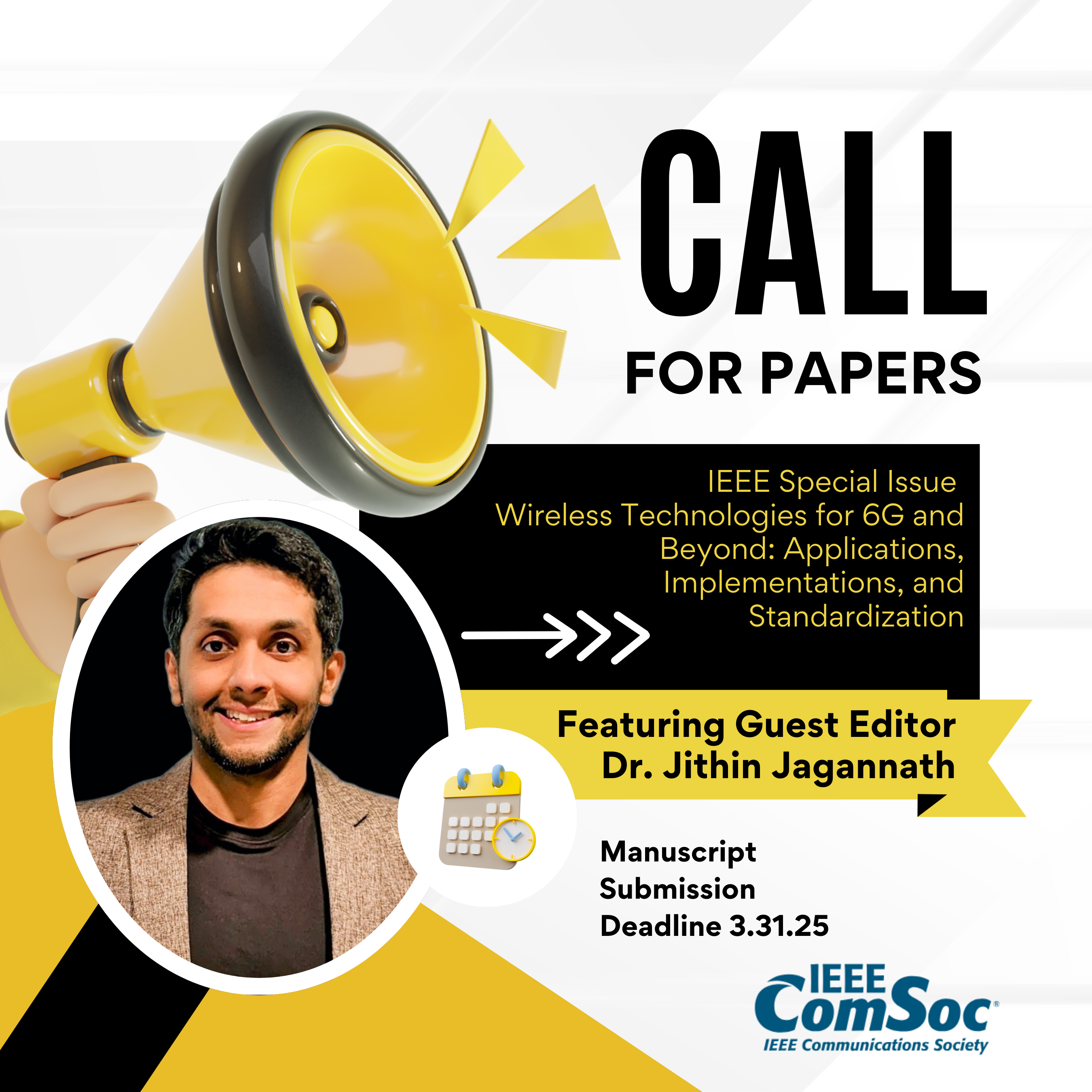We are thrilled to announce that Dr. Jithin Jagannath will serve as the Guest Editor for a special issue of the IEEE Communications and Standards Magazine, focusing on “Wireless Technologies for 6G and Beyond: Applications, Implementations, and Standardization.” This special issue presents a unique opportunity for researchers and industry experts to contribute to the future of wireless communications.
Wireless communication technologies have fundamentally transformed how we connect and communicate, allowing data transmission without physical connections through electromagnetic waves. This encompasses a range of technologies, including cellular networks (2G to 5G), Wi-Fi, Bluetooth, satellite communication, and IoT protocols, like Zigbee and LoRaWAN. Each of these technologies serves specific purposes, from mobile communication to local networking and remote connectivity, enabling applications in everyday life and industry. Standardization is essential, ensuring interoperability, compatibility, and efficiency among diverse systems. Organizations, such as the International Telecommunication Union (ITU), Institute of Electrical and Electronics Engineers (IEEE), Third Generation Partnership Project (3GPP), International Mobile Telecommunications (IMT), and the Internet Engineering Task Force (IETF) play crucial roles in developing and maintaining these standards. Standardization not only facilitates seamless communication between devices from different manufacturers but also fosters innovation by providing frameworks for new technologies to be integrated.
Academia and industry are continuously focusing on new technologies for various emerging applications, aiming to support heterogeneous use cases seamlessly. To address next-generation wireless communication, we invite submissions to the call for papers. As the world rapidly transitions to 5G and prepares for the next generation of wireless technologies, significant advancements in system design, deployment, and standardization are crucial. This Special Issue (SI) seeks innovative research that explores new applications, architectures, and implementation techniques for 5G and beyond, including emerging use cases such as IoT, V2X, ultra-reliable low-latency communication (URLLC), and massive connectivity. Additionally, we encourage contributions that focus on the development of industry standards and regulatory frameworks necessary to support global adoption in wireless networks.
This SI covers a broad range of topics in wireless communication, including communication over high-frequency bands, flexible multiple access techniques, AI/ML for network optimization, and spectrum management with energy efficient system design. Accepted papers will help advance the field of wireless communications, bridging the gap between cutting-edge research and practical standardization efforts. Topics of interest include, but are not limited to:
- Flexible multiple access techniques like Sparse Code Multiple Access (SCMA), NOMA, RSMA, etc.
- Reconfigurable Intelligent Surfaces (RIS)-aided wireless systems.
- AI/ML for wireless systems.
- Orthogonal frequency division multiplexing (OFDM) and orthogonal time frequency space (OTFS) modulation.
- Beamforming techniques for mmWave and Terahertz MIMO systems.
- Resource allocation in 5G and beyond wireless systems.
- Software-defined networking (SDN) and network function virtualization (NFV) for 5G and beyond.
- Network slicing for 5G and beyond use cases.
- Integrated terrestrial and satellite communications.
- Modulation techniques for ultra-reliable low-latency communications (URLLC).
- AI-driven network optimization and self-organizing networks (SONs).
- Machine learning for signal detection and channel estimation.
- Enabling technologies for 6G.
- Preliminary standardization efforts for 6G.
- Energy-efficient technologies for 5G and beyond.
- Vehicular and V2X communications.
- Contributions to IEEE, 3GPP, and ITU standards for 5G and beyond.
- Physical layer security techniques in 5G and beyond.
- Resource allocation and spectrum management in 5G and beyond.
- Edge computing and IoT in 5G networks.
- Massive MIMO systems and beamforming techniques.
- Open Radio Access Network (O-RAN)-based design.
Call for Papers
If you are conducting research or have developed solutions in any of the outlined areas, we encourage you to share your findings. This is a chance to contribute to the advancement of 6G technologies and have your work showcased in a prestigious publication.
Submit your high-quality papers through the following link: IEEE Communications and Standards Magazine Submission
Join us in this exciting venture as we explore the limitless possibilities of 6G and beyond. Your contributions can help shape the future of wireless technology.
Important Dates
- Manuscript Submission Deadline: 31 March 2025
- Authors’ Revision Notification Date: 1 May 2025
- Revised Manuscript Submission Deadline: 1 July 2025
- Final Decision Notification Date: 1 September 2025
- Camera-ready Files Due: 30 September 2025
- Guest Editorial/Column: 15 October 2025
- Expected Publication Date: December 2025

